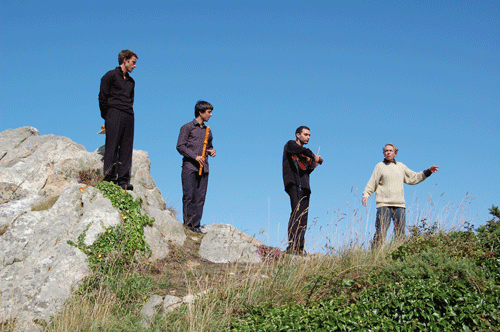Theory as Practice
Marxist arguments permeate Jacques Rancière’s philosophy – including his aesthetic theory
Marxist arguments permeate Jacques Rancière’s philosophy – including his aesthetic theory

What is the ‘task of revolutionaries’? Not to combat ideology with science but to ‘oppose bourgeois ideologies with the proletarian ideology of Marxism-Leninism.’ This quotation may sound like a slogan for East German student cadres, but it doesn’t come from Lenin, nor from Mao’s ‘Little Red Book’, but from Jacques Rancière. Although written four decades ago, the words cannot be attributed to youthful folly alone. Instead their context sheds light on the theoretical roots and strategies of Rancière’s intellectual interventions – right up to the present.
This continuity is most apparent in his book Althusser’s Lesson (2011; La Leçon d’Althusser, 1974), a minutely detailed and entertaining history of French theory in the post-1968 years which has now been published in English. By contrast, Moments politiques : interventions 1977–2009 (2009), a collection of interviews and newspaper articles, contains only traces of Marxism. But here, too, the focus is on the social role of theory, its relationship to praxis and to the struggles and events unfolding around May 1968 as a political and theoretical point of reference. In 1969, Rancière wrote the text from which the above quotation is taken: ‘Sur la théorie de l’idéologie. Politique d’Althusser’ (On the Theory of Ideology: Althusser’s Politics) was published in France in 1973, and is now included in the appendix of Althusser’s Lesson.
Rancière was Louis Althusser’s pupil, and defined himself in opposition to his former teacher, as the book and essay titles suggest. Yet what took place was something far more interesting than some rarefied Oedipal drama. For Rancière, Althusser embodied the relations of the production of knowledge in the university along with two interrelated shortcomings of knowledge itself: Theory seals itself off from unforeseen external developments and is the privilege of academic teachers. Both were clearly in evidence in May 1968 (and in the years and debates that followed). Instead of opening up politically to the student revolt and seeking theoretical rapprochement, Althusser withdrew to the position of the Communist Party, which saw the students as nothing but petit-bourgeois delinquents. Moreover, he maintained a theoretical distance by proclaiming theory a scientific discipline independent of street fighting and everyday politics; in his view, legitimate knowledge was only generated by those with an academic license. According to Rancière, what was at stake in 1968 was ‘the defence of the hierarchies of knowledge’, and Althusser was among their most wily advocates. Theory was deployed defensively as a two-fold ordering force: It ordered praxis into the relevant and the irrelevant, and it upheld the existing institutional system.
This state of affairs, not just bourgeois ideology, was opposed by the ‘proletarian ideology’ which Rancière understood at the time as a product of self-determined ‘movements of struggle’. If one ignores the Leninist diction and crude dualism, this position already points to his later alignments, both dynamic and unexpected. Furthermore, the debate on ideology contains the seeds of his theory of aesthetics and his central political credo: According to the early Rancière, ideology describes people’s relationship not with truth but with power and knowledge, which they are able to (theoretically) see through and (practically) thwart. Even without teachers and The Party, he contends, they intervene in the distribution of ‘the visible, the thinkable, and the possible’ – in what he later described as the aesthetic.
This position, shaped in the early anti-Althusser works, runs throughout Rancière’s writings. A close linking of political concerns and aesthetic theory reappears in a later attempt to establish
a counter-position to Pierre Bourdieu’s sociology. In The Philosopher and His Poor (2004; Le philosophe et ses pauvres, 1983), Rancière accused Bourdieu (along with Plato, Karl Marx and Jean-Paul Sartre) of always using the lower classes to underpin his own business: talking about and on behalf of the poor. For Rancière, no one contributed more to making the saying ‘let the cobbler stick to his last’ a reality than these interpreters of revolutionary artisans. He explicitly relates this tendency not only to intellectual and political praxis but also to aesthetic experiences while arguing against Bourdieu with the same vehemence expressed against Althusser. With his studies on class differences in taste and on access to art institutions, Bourdieu allegedly attributes deficits to the poor that he describes as ‘distinctions’. For Rancière, the fact that the lower classes lack the educational capital to properly appreciate art and that they are often unable to perceive their own structural disadvantage is not a description of the effects of power but rather an effect of sociology itself – a discipline that creates what it claims to expose: social order.
From here, there is a direct line to Rancière’s philosophy of equality, which takes equality as the point of departure – not the goal – of all sensory experience and all politics. In contrast to Bourdieu’s sociology, Rancière’s philosophy is based on the assumption of differences. Rancière dismisses the fact that Bourdieu continually reflected to an almost unmatched degree upon the dangers of performative effects inherent in every work of social science. Bourdieu would not have been politically opposed to shoemakers and all of the world’s other marginalized people pouring into museums – he just considered it unlikely on empirical grounds.
Rancière drew his conclusions from his constant aversion to hermetic theorizing – theory as an academic privilege – and its consequences in terms of political order. Despite his integration into Marxist tradition, his break with Althusser is also the beginning of his rejection of this theoretical frame of reference. ‘Anyone who assumes inequality from the outset,’ Rancière sums up against Bourdieu and also against Marx, ‘is sure to find it again at the end’. Unfortunately, we are told surprisingly little about what shores up Rancière’s position of equality against other people’s dilemmas and pitfalls. After all, academics do share the same relations of production.
_Translated by Nicholas Grindell _















